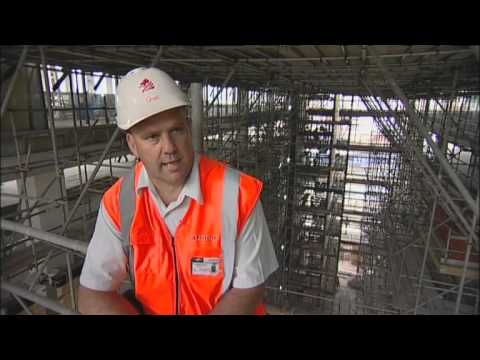
Construction Bond
What is a Bid Bond?
A bid bond is required for many construction jobs. These bonds allow companies to bid on jobs that will require a final performance and payment bond. Accordingly, these bid bonds are really something that each bidder needs to use when bidding the job, and build the cost into the bid. A bid bond has three parties. First, the surety, which is the party that guarantees that the contractor will actually take the job if they are awarded the job. The contractor gets the surety bond for the benefit of the Obligee. The Obligee is the party that requires the bond, which is the government or owner of the site. The contractor needs to get the bid bond just to get the job. Because of that, they are guaranteeing that they will actually perform the job if they are granted the job. So, the surety company wants to be sure that the bid is in the proper range (not too low) as they do not want to have to pay the bid damages in case the job is awarded to the contractor.
Identify a Realistic Job Budget
Prior to starting any project, every structure owner needs to step back and do some work in preparing a realistic budget. When the budget is identified, the owner sets the required date as to when the project has to be finished.
Do not always take the most affordable bid. I understand this is a difficult one to follow as we all have to keep commercial construction budget plans in check, but lots of owners have regretted going with the low-bid. The low-bidding basic service provider was commonly in over its head, meaning due dates were missed out on or work was substandard and another, more knowledgeable GC was generated to finish the task– at an extra expense.
Discuss & Establish a Design Plan
When an owner begins planning a structure task, he/she will likely have a very certain vision of exactly what the final item will certainly look like. Prior to beginning the project, it is important that the owner feels positive that the job’s design team will satisfy his/her requirements as well as the requirements of any other parties who might be using the center. The industrial specialist and owner require to work together to guarantee that the design plan for the task is actually build-able.
Be Practical in Your Schedule
The scheduling of the structure task is another extremely important component to this process. This is particularly true if the owner has a “drop dead” due date as to when the project need to be completed. An entrepreneur may have important practical requirements of the facility, whether that requirement is for the specific purpose of providing the required area to someone or a circumstance where income generation from the facility is of urgent concern. For that reason, it is essential to set a reasonable period for task conclusion. This time frame has to be figured out early in the design planning procedure. In order for the owner to have self-confidence that the routine is being imposed, the contractor ought to carefully monitor the routine throughout the construction procedure and immediately encourage the owner of any changes.
Know the Threats to the Job; From Budget to Timing
One of the primary reasons that a concise and clear budget plan and schedule require to be established is to prevent unnecessary risk on the building task. No matter the project’s intricacy, all building jobs include a level of risk. Being ready and communicative throughout the procedure can substantially decrease risk. The industrial contractor needs to be sure that business owner has an clear understanding of all possible risk areas in addition to the parties responsible for handling each of those dangers.
Get a Bond from Your Contractor
A knowledgeable owner of a construction contract will go ahead and get a payment and performance bond from the general contractor. We contacted a bond company, Swiftbonds, to give us some of their ideas on what to ask for. They were adamant that a payment bond be required if you do not have a longstanding relationship with your general contractor. The payment bond would be a good way to protect against a contractor not paying a subcontractor, material provider or supplies vendor.
A performance bond is also a good idea. This type of bond provides assurance that the contractor will perform the work, and perform it according to the specifications. Although this means that your blueprints and designs need to be spot-on in case of a claim, this will also protect against a dishonest builder or a sloppy builder. That way, even if the project is finished, it will have to live up to your needs (usually the bond lasts for a year), which will enable you to determine any defects in the property.
Claims on either type of these bonds are usually made to the surety that is writing the bond. That surety (usually a large insurance company like Liberty Mutual, AIG or someone like that), will then assign someone to evaluate the claim for its validity. They will look at the project and see whether it was done, or done according to the design specifications. If it was not completed properly, then they have the option of choosing another contractor to finish the project. That contractor is still required to finish the project according to its specifications. In certain rare circumstances, a surety can choose just to pay damages to the owner in the amount of the bond. This is really rare, as the costs for completing the project are generally much less than paying damages.
Evaluate Your Own Level of Proficiency
When this level of knowledge is identified, the contractor will have a clear understanding of the outside resources that will certainly require to be utilized during the task. This clarification in between parties could likewise enable a more sensible and precise job conclusion date to be set.
Some Things to Consider on Selling Your Property
Curb Appeal Matters
Paint the Exterior. A fresh coat of outside paint can brighten up structures on your property. Repaint can make structures on your home appear new once more by getting rid of blemishes and use, luring buyers to give your commercial property a better look.
Clean Up the Landscape. A diligently kept landscape can make a world of distinction on a possible purchaser’s first impression of your property. Be sure to have driveways and parking lots sealed, parking space lines painted, and sidewalks fixed. In addition, make certain to have all garbage and debris eliminated from the home. This not just enhances the visual appeal, however gives purchasers peace of mind knowing the landscape work has actually already been done for them.
Tidy up the Interior: Be sure to patch up walls, paint, and have carpetings inside your structure thoroughly cleaned. These easy tasks can refresh your building’s interior.
Follow these tips on commercial buildings and you can create a sales process that will get you top dollar for your real estate empire. We appreciate you taking the time for reading this.




